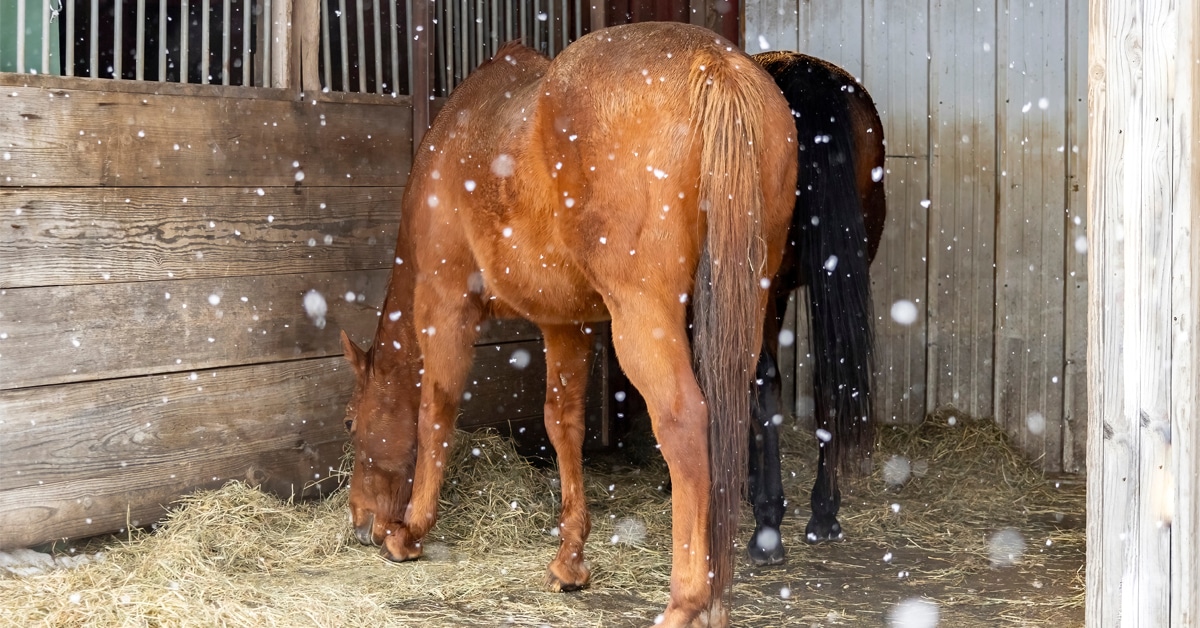Heading to a horse show or event should be an enjoyable experience, seeing friends, scoping out the competition and most importantly, showing off the result of all your hard work. It should end in ribbons and prizes not with illness, panic, quarantine or a trip to the nearest equine hospital. However, it seems that each year the mixing of horses and the stress of travel turn show grounds into breeding grounds for infectious disease. This doesn’t mean we should all sell our trailers and stay at home though. Armed with knowledge about potential pathogens and the tools and tricks to prevent the spread of disease, we can make showing safer for all our horses. One infectious disease, Equine Herpes Virus-1 (EHV-1) has been in the news a lot lately, causing outbreaks in all parts of North America.
Last spring, an outbreak of the neurologic form of EHV-1, also known as Equine Herpes Myeloencephalopathy (EHM) spread throughout the western US and Canada. Its origin was traced back to the National Cutting Horse Association Western National Championships in Ogden, Utah. Thanks to the hard work of the USDA and the local veterinarians, this outbreak was contained quickly and on June 22, 2011 the USDA issued its final report showing a total of 90 confirmed cases in 10 states and 13 related deaths. Most recently an EHV-1 outbreak was identified at two Florida show circuits, Ocala and West Palm Beach, leading to the quarantine of show facilities and several surrounding farms. There are also unrelated cases currently being quarantined in Tennessee, Illinois and Utah.
EHV-1 is a highly contagious virus that is spread from horse to horse through direct contact, on buckets, tack and equipment or on the clothes and hands of horse owners. Though we have only been hearing about this disease over the last few years, it has been ubiquitous in the horse population for ages. It was previously called Rhinopnumenitis, or “Rhino” to most horsemen. So if the disease has been recognized for decades many wonder why we are just recently having so many outbreaks.
EARLY DAYS
A large percentage of horses are infected within the first weeks to months of life. While disease may not occur at this time it results in a latent (or hidden) infection; meaning there are many horses out there harboring the virus but showing no signs.
During times of stress the virus can reactivate causing clinical illness, viral shedding and spread of the disease. This is how EHV-1 has remained in the horse population and how outbreaks emerge from a seemingly healthy group of horses. Researchers have noted that while there is an increased incidence in the number of outbreaks reported, it is unknown whether the virus is becoming more pathogenic or we are just doing a better job of recognizing the problem.
EHV-1 is most commonly seen in young performance horses, causing mild respiratory disease. The virus can also lead to abortion in pregnant mares. Most importantly the infection can cause neurologic disease by causing inflammation of the blood vessels that deliver oxygen and nutrients to the spinal cord and brain. This form by far has the highest rates of morbidity and mortality and the greatest impact on the equine industry.
The incubation period (time from infection to illness) of EHV-1 is typically 2-10 days. Horses with respiratory infections will have fever (102 F), nasal discharge, cough, depression and lack of appetite. These signs are indistinguishable from other upper respiratory viruses like Equine Influenza Virus (EIV) or Equine Rhinitis A Virus (ERAV).
The abortive form of the disease results in fetal loss in the third trimester of pregnancy or delivery of a foal that succumbs to lesions in the lungs and liver within three days of birth. Over 50% of exposed horses can be affected in an EHV-1 abortion storm. In contrast, roughly 20% of infected horses show neurologic signs in EHM outbreaks. Signs of EHM include fever (102 F), nasal discharge, lethargy, lack of coordination, hind-end weakness, dog-sitting, loss of bladder function and urine dribbling as well as diminished tail and anal tone. The respiratory signs and fever may, or may not, precede the neurologic deficits.
Horses with severe clinical signs of neurological EHV-1 illness are thought to have large viral loads in their blood and nasal secretions and therefore, present the greatest danger for spreading the disease. Immediate separation and isolation of identified suspect cases and implementation of appropriate biosecurity measures are key elements for disease control.
DISINFECT, ISOLATE AND SUBMIT
In the face of an outbreak, follow the ‘DISH’ protocol to prevent spread of the disease:
– Disinfect areas contaminated by the virus
– Isolate affected horses
– Submit samples for diagnosis
– Implement appropriate biosecurity procedures to prevent viral spread
The virus is unlikely to survive for longer than seven days in the environment but areas where an infected horse was housed should be disinfected. Equipment, stabling areas (including temporary stalls at shows) and trailers should be washed with a 10% bleach solution or quaternary ammonium compound and rinsed well before using again.
When a case of EHV-1 is detected, any horses that have had direct contact with the affected horse should be isolated. This means no movement of horses in or out of the barn or farm. Horses should be isolated for a minimum of 21 days, as this is the average time that an affected horse will shed the contagion. When an entire facility is locked down the quarantine will last until 21 days after the last occurrence of a new case. Because aerosol and fomite transmission is important in the spread of disease, isolated horses should not have any nose-to-nose contact with healthy horses, they should not share buckets, feed tubs or fence lines with healthy horses and personnel handling these horses should follow biosecurity protocols to prevent spread of the disease from the isolated area to the clean areas.
Diagnosis is made from blood samples and nasal swabs which can detect the disease even in horses that are not yet showing clinical signs. Detection of virus on a nasal swab indicates that the horse is actively secreting the virus and putting surrounding horses at risk.
The fastest and most common test currently run is a PCR (polymerase chain reaction), which can detect even low virus loads. Horses with a positive blood sample are considered much more likely to be “high shedders” of the virus.
Preventing the spread of this, and any disease, relies heavily on biosecurity and good hygiene practices. Wear gloves when handling quarantined horses. Always wash hands between handling horses and if this is not possible have alcohol-based hand-sanitizers available. Your hands are not the only culprits, boots can track pathogens through a farm so foot baths containing appropriate disinfectants should be placed at the entrance and exit of all quarantine barns and stalls. Full personal protective equipment (PPE) provide the best protection but are often quite expensive and impractical in non-hospital settings. Quarantine facilities should have dedicated equipment such as pitchforks, shovels, wheelbarrows and brooms that are disinfected between uses. Each horse that is quarantined should have their own water buckets, feed tubs, halters and lead rope. After the quarantine has been lifted the equipment and facility should be thoroughly disinfected.
TREATMENT
Treatment generally consists of supportive therapy. Intravenous fluids and nutrition must be provided to maintain hydration and body weight. Anti-inflammatory medications such as phenylbutazone or flunixin meglumine (Banamine) along with corticosteroids such as dexamethasone will reduce inflammation caused by the virus. If a horse has lost the ability to urinate on its own, the bladder must be expressed or emptied with a urinary catheter. Horses that are ataxic (un-coordinated) and having trouble standing or ambulating may require the assistance of a sling and must be housed in a well-bedded stall with padded walls to prevent self-inflicted injury from stumbling or falling.
Anti-viral drugs such as acyclovir are available but their use has had varied success and research is currently underway to find an effective and affordable drug to use in these cases. Prognosis depends on severity and duration of signs.
PREVENTION
Prevention of EHV-1 outbreaks is multi-factorial. Vaccines against EHV-1 are widely available and usually formulated in combination with influenza. This is the ‘Rhino’ portion of your ‘flu/rhino’ vaccine. Unfortunately these products will immunize a horse against respiratory and abortive form of the virus, but do not protect against the mutated strain that causes neurologic disease.
The second step is to closely monitor your horses for any signs of disease. Rectal temperatures should be recorded at least once a day for all horses three days prior, during and the week following travel to an event. EHV-1 typically triggers a biphasic fever, with a spike in temperature on day 1-2 of infection and another again on day 6-7. If horses are not constantly monitored this important warning sign can be missed.
If a horse has a fever or displays any of the signs of respiratory or neurologic EHV prior to shipping, they should remain at home. Horses who become ill at a show should be isolated and examined by a veterinarian and all horses returning from a show (regardless of health status) should be temporarily isolated from the rest of the herd and monitored for signs of fever or illness so as not to bring disease back to your farm.
Finally, when your horses mingle with horses whose health is unknown to you, be cautious. Don’t allow nose to nose contact between your horse and a stranger (especially if that horse does not appear 100% healthy). Do not share buckets, brushes or tack outside of your stable and practice good personal hygiene around the show grounds.
If you suspect a horse has EHV-1, or are concerned about a potential outbreak, contact your veterinarian immediately so that proper quarantine and treatment protocols can be put in place as soon as possible. Even though EHV-1 is an important pathogen, it is not considered a reportable disease according to many state regulations, so it is up to the horse owners and local veterinarians to recognize the disease and alert the appropriate government offices so that proper tracking and containment can be performed. If we are all vigilant about monitoring our horses before, during and after traveling to events, we can detect outbreaks earlier and prevent the spread of this disease. HSI
Dr. Joan Norton VMD DACVIM founded Norton Veterinary Consulting and Education Resources to promote equine veterinary education to horse owners, professionals and veterinarians. Dr. Norton offers a series of Online Education Courses through her website:
www.nortonveterinaryconsulting.com.
The Latest









